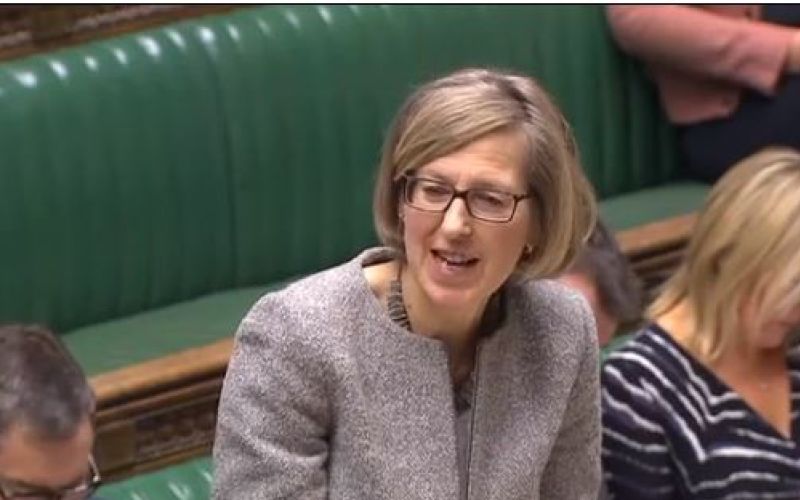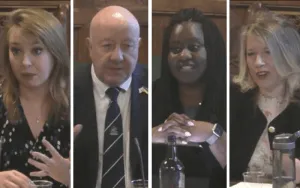The minister for disabled people has been caught misleading MPs – again – as she tried to defend her government’s repeated breaches of the UN disability convention.
It was the second time in five months that Sarah Newton (pictured) has misled MPs in a House of Commons debate about the support provided to disabled people.
Labour MPs, including the shadow minister for disabled people Marsha de Cordova, had queued up to highlight the government’s “brutal” cuts to social security and its violations of the UN Convention on the Rights of Persons with Disabilities (UNCRPD).
De Cordova told Newton: “Over the past eight years, we have seen not the progressive implementation of disabled people’s rights, but their unprecedented erosion and violation.”
And she said that “brutal cuts to disabled people’s social security” had “made a mockery” of the convention’s article 19, on the right to live independently, and article 28, on the right to an adequate standard of living.
She said: “Half of people in poverty are now either disabled or living with someone who is disabled.
“Almost a quarter of disabled people are now forced to miss meals because of economic hardship, and one in five cannot pay to heat their homes.”
De Cordova, one of parliament’s few disabled MPs, pointed out that the government was helping to organise a global disability summit in London next month, but she asked: “Why should any other state take them seriously on disability rights when they are systematically violating the rights of disabled people and continue to ignore the UN’s recommendations?”
The debate, secured by Labour MP Rosie Duffield, was discussing last autumn’s report on the UK’s implementation of UNCRPD, and the conclusion of the UN’s disability committee that the UK government should make more than 80 improvements to the ways its laws and policies affect disabled people’s human rights.
In a briefing prepared ahead of the debate, the Equality and Human Rights Commission and other members of the UK Independent Mechanism* – the official bodies for monitoring the UK’s progress in implementing the convention – had called on the UK government to describe how it would “comprehensively address” the UN committee’s findings.
UKIM raised concerns that the government had not made any commitment to implementing the recommendations.
And it said the government had also rejected the committee’s recommendations on social security reform in its 2016 inquiry report, which “found evidence of grave and systematic violations of disabled people’s rights” to an adequate standard of living and social protection; work and employment; and independent living.
UKIM said “extensive evidence” showed disabled people continued to face “serious regression of their rights to an adequate standard of living and social protection, and to live independently in the community”.
And it said that the continued failure to act on the UN committee’s recommendations “goes against the UK Government’s stated commitments to equality and inclusion for disabled people, and undermines its position as a global leader on disability rights”.
The UKIM also said that it was “concerned about the lack of UK Government progress in protecting the rights of disabled people in the UK” and had “particular concerns about the adverse impact of social security reforms on disabled people”.
Despite the detailed evidence included in the UKIM briefing and the comments of opposition MPs, Newton told MPs yesterday (Wednesday) that ministers “utterly refute the allegations that the government have discriminated against disabled people, systematically undermined and violated their human rights and, worst of all, that we are targeting their welfare support”.
In attempting to defend her government’s record on cuts to social security, she told MPs that there had been “no freeze in the benefits that disabled people receive”.
But this is not true, a fact repeatedly pointed out to Tory ministers and her party.
Although disability living allowance, personal independence payment and the employment and support allowance (ESA) support group top-up are exempt from the benefits freeze – which is set to last to 2020 – there is no exemption for the main component of ESA and the top-up paid to those in the ESA work-related activity group, which continue to be frozen.
DWP had not been able to say by 1pm today (Thursday) whether Newton would apologise for misleading MPs.
It is the second time this year that Newton has misled MPs in a Westminster Hall debate.
In January, she told MPs taking part in a debate on the closure of the Independent Living Fund (ILF) that the decision to close ILF “was challenged in a judicial review, and throughout the process the DWP won on all points”.
But the court of appeal had actually been highly critical of Esther McVey in 2013, and found that her decision to close the fund when she was minister for disabled people was unlawful, and that she had breached the Equality Act’s public sector equality duty.
McVey had been appointed as the new work and pensions secretary – and Newton’s new boss – just a day before January’s debate took place.
*The UK Independent Mechanism’s members are the Equality and Human Rights Commission, the Equality Commission for Northern Ireland, the Northern Ireland Human Rights Commission and the Scottish Human Rights Commission

 Welsh government’s disability rights plan ‘is a smokescreen’ to hide lack of teeth and targets
Welsh government’s disability rights plan ‘is a smokescreen’ to hide lack of teeth and targets Two terminally-ill women to complain to UN over passage of assisted dying bill through parliament
Two terminally-ill women to complain to UN over passage of assisted dying bill through parliament Lords is ‘aeons ahead’ of Commons on access, disabled MP tells colleagues
Lords is ‘aeons ahead’ of Commons on access, disabled MP tells colleagues